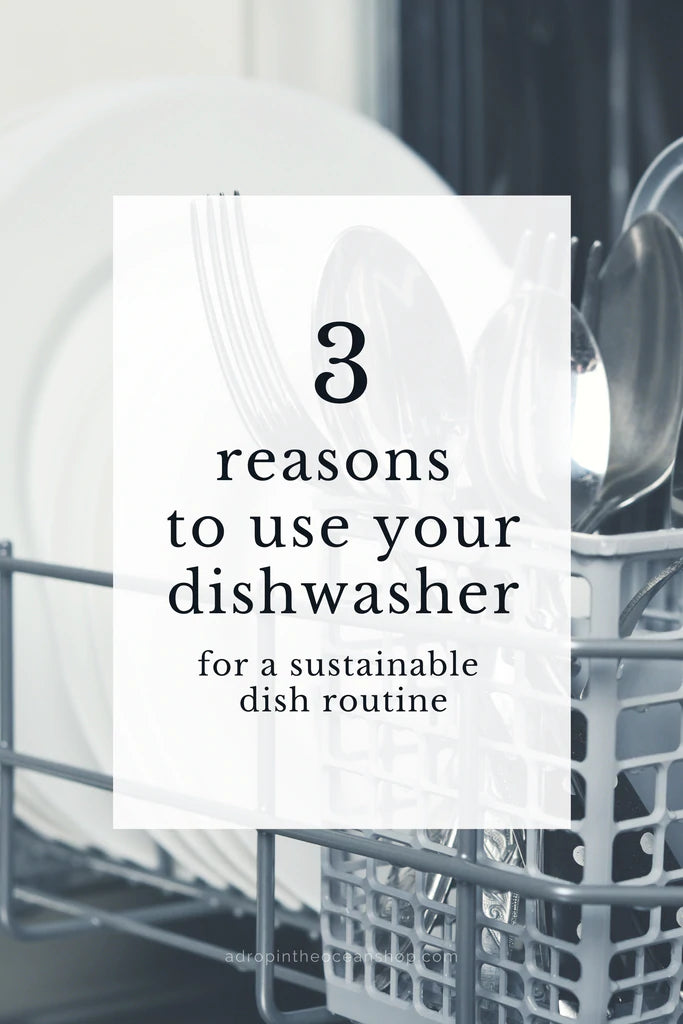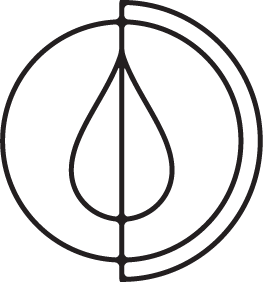3 Zero Waste Reasons to Use Your Dishwasher

This post first appeared in our weekly Make Waves Mondays email series on May 31, 2021.
Helloooooo friend! I hope that you’ve been able to take some time off this week and enjoy time outdoors in some sunshine.
Today’s post is the fifth in our Small Change, Big Impact series, and today we’re talking about doing the dishes.
BUT FIRST, here’s a fun fact about me that you didn’t ask for. 😊
Some people have idyllic morning routines that look like waking up at 5am, meditating, journaling, practicing yoga, and sipping tea while watching the sun rise.
My morning routine is waking up somewhere between 7 and 8am, putting water on the stove for coffee, doing all the dishes from the day before, making my bed, and drinking said coffee while either answering emails or watching Grey’s Anatomy.
Yes, washing dishes is part of my morning routine. What a fun routine it is 🤣
But…what’s the most sustainable and zero waste way to wash our dishes?
Well, my friend, you can put that loofah down!
Water Use
Running your faucet uses about two gallons of water per minute. (This can be reduced with aerators or low-flow faucets, but the standard is about 2 GPM.) To wash the equivalent of a full load of dishes by hand, most of us will use about 20 gallons of water.
That’s more than 150 bottles of water - just to wash one load of dishes by hand!
On the other hand, running that same full load of dishes in a standard dishwasher cannot use more than five gallons of water. If your dishwasher is Energy Star certified, that number drops to 3.5 gallons.
That’s 75 to 82% less water than washing by hand. WHAT.
AND - here’s a fun fact I just learned. Newer dishwashers actually work by sensing how clean the water is. So they’ll spit out a little bit of water, wash the dishes, and then sense how clean the water is as it drains. If the water isn’t clean, it’ll spit out a little more water and repeat the process. This continues until it senses that the water is clean.
So your dishwasher isn’t just spewing water on your plates for 30 minutes. It’s actually measuring how clean the water is and adjusting accordingly. I’M SORRY, WHAT?! Talk about zero waste.
Technology is so cool.

Photo by Nathan Dumlao on Unsplash
Energy Use
Okay so this one actually surprised me. Did you know most dishwashers actually have a built-in water heater that’s more efficient than the one in your basement?
To heat just two gallons of water flowing from your faucet uses about 0.28 kilowatt hours (kWh) of electricity.
Like we said above, if you’re washing a full load of dishes by hand, you’re likely using about 20 gallons of water. To heat those 20 gallons of water, you’re using about 5.63 kWh. That’s about 8 pounds of carbon dioxide emissions, or the equivalent of driving about 10 miles.
Let’s say you do dishes just 182 out of the 365 days of the year (about every other day). That’s about 1,025 kWh, or 1,601 pounds of carbon dioxide, or the equivalent of driving about 1,826 miles.
That’s like driving from Seattle to Wichita. Omg.
Using a dishwasher, on the other hand, uses about one-quarter of that energy. Energy Star certified dishwashers use no more than 270 kWh per year.
That cuts your emissions to 422 pounds of carbon, or the equivalent of driving about 481 miles - about the distance from Seattle to Missoula.
Time + Money Savings
According to Energy Star, washing your dishes in a dishwasher rather than by hand will save you about $130 every year on your utility bills, and nearly 10 days otherwise spent scrubbing dishes.
And remember, around here we define zero waste as more than zero trash. Wasted time, wasted energy, wasted resources.
If I can save $130 and 10 days of my life every year, I’m doing it.
Other Ways to Save Waste
If you really wanna step up your waste-saving game, scrape your dishes into a compost bin rather than rinse into your disposal. If your dishes do need a rinse, the sooner the better, rather than letting the food remnants dry first.
And if you’re washing things by hand (I do all of my pots and pans, wooden cutting boards and spoons, and coffee mugs by hand), turn off the faucet whenever you can. Get your dish brush wet enough to create a lather with your dish soap, wash a few dishes at a time, and rinse them together.
If you prefer to fill your sink with water, try instead a large pot. You’ll use less water that way :)

A Note
Keep in mind that all of these are generalized numbers, and are applicable for full loads.
Unlike certain dishwasher detergent brand commercials promote (*cough* Cascade *cough*), please do not run your dishwasher every day for just a couple of dishes. That math just doesn’t work. That brand is greenwashing you into using more water, more energy, and MORE OF THEIR PRODUCT (that’s full of chemicals that aren’t people- or planet-safe), by promoting using the dishwasher for just a few dishes every day because it’s “more sustainable.”
It’s not.
Don’t let ‘em greenwash you. You’re better than that. You’re an EcoWarrior.
So, friend, press “start” on that dishwasher of yours and rest easy knowing you’re taking small actions that have a big impact on the planet and people.
Talk soon!
Sources:
CNET: Dishwasher vs. hand-washing: What saves more water?
Energy Star
NPR: To Save Water, Should You Wash Your Hands Of Hand Washing Dishes?NRDC: 9 Tricks That Save Tons of Water
Treehugger: Built in Dishwashers vs. Hand Washing: Which Is Greener?
Water Footprint Calculator









Leave a comment